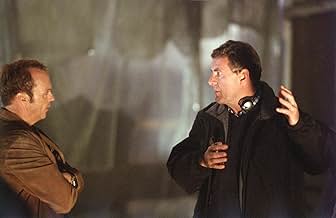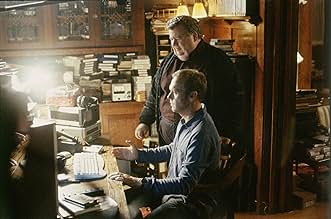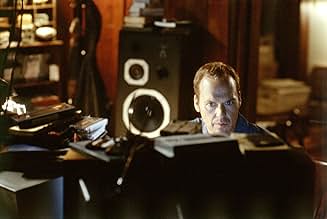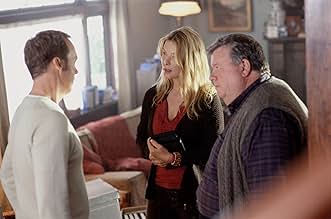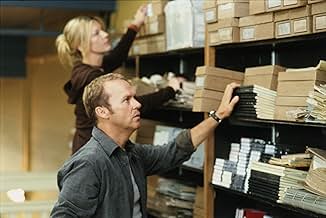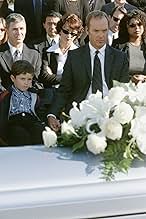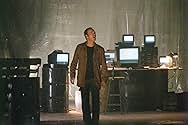IMDb रेटिंग
5.5/10
52 हज़ार
आपकी रेटिंग
एक वास्तुकार की अपनी पत्नी से कब्र से परे बात करने की इच्छा अलौकिक प्रभाव के साथ एक जुनून बन जाती है।एक वास्तुकार की अपनी पत्नी से कब्र से परे बात करने की इच्छा अलौकिक प्रभाव के साथ एक जुनून बन जाती है।एक वास्तुकार की अपनी पत्नी से कब्र से परे बात करने की इच्छा अलौकिक प्रभाव के साथ एक जुनून बन जाती है।
- पुरस्कार
- 1 जीत और कुल 2 नामांकन
फ़ीचर्ड समीक्षाएं
Legitimately creepy and unsettling without trying to hard or relying on female nudity to try and sell a lame story like most horror movies! I was on a marathon of horror movies and watched final destination, the gift, it lurks below, and this and this movie was the best by far. It made sense, it was logical, it was creepy, decent acting and based on reality but with amped up supernatural stuff and no nudity! Recommended :)
White Noise comes across as a horror movie that tries to do something original before they are forced into doing a remake of an Asian film. It will still draw comparison with Hideo Nakata's Ring trilogy because of the static TV's but that is unfair due to the subject. The subject being Electronic Voice Phenomenon (EVP), which is a paranormal occurrence where the dead contact the living through static, recorded on the TV or a sound recording device. Original enough to make a movie about plus scary things jumping out of a static TV is relevant to the subject. Yay Hollywood. The apparent decent plot and the not-too-shabby cast headed by Michael Keaton actually had me very eager to see this, such a shame then that the movie actually doesn't do what it says on the tin.
The first half of the movie is a decent drama about the loss of a mans wife and his obsession with contacting her from beyond the grave whilst his work and the relationship with his son suffers. The second half however seems to just draw from the basic scary movie template and disappointingly swerves away from the dead contacting the living and into Keaton running around like a psychic detective in a race against time trying to save people from dark forces.
The movie opens in generic perfect home situation. Keaton plays Jonathan Rivers the successful architect who is married to his wife Anna the successful author, even his sons mother (the divorcée) has a good relationship with Mr. & Mrs. Rivers. Apart from the radio skipping to static a few times (an unused plot device?) things seem pretty rosy. Until "I love you" gets mouthed from the wife leaving the driveway taking the kid to school. Automatic dead meat. When will they learn? The police assume she slipped from the motorway, bashed her head on a rock then got taken away by the tide but Jonathan doesn't accept her death and doesn't give up hope. However, on his first day back from work since his wife went missing he is followed by a stranger whom he confronts. The stranger turns out to be some sort of expert in a phenomenon known as EVP and he says not only is Anna dead but she has been contacting him from the other side. Jonathan dismisses it until she leaves a message on his answering machine. Yeah, it is that simple. Cue Jonathan getting obsessed about finding out what her message is, mishaps happening and Jonathan getting even more obsessed over something completely different. Drawing in another believer in EVP they investigate into messages the recording equipment seems to be getting from the future.
The ending leaves the movie ridden with plot holes, which has frankly become expected of movies like this from the past few years. It could have been so much more. Perhaps the director was wary of making this film 'The Sixth Sense from the other point of view' but then again the CGI scary ghosts wouldn't work in a more subtle setting like that. The plot turns into some non-sensical slush whilst the score let's the film down. The acting wasn't the strongest either but if you want to be scared every 20 minutes by the volume being cheaply cranked up and CGI ghouls flying out of static then go spend your hard earned cash on this.
6/10 Robb Idle
The first half of the movie is a decent drama about the loss of a mans wife and his obsession with contacting her from beyond the grave whilst his work and the relationship with his son suffers. The second half however seems to just draw from the basic scary movie template and disappointingly swerves away from the dead contacting the living and into Keaton running around like a psychic detective in a race against time trying to save people from dark forces.
The movie opens in generic perfect home situation. Keaton plays Jonathan Rivers the successful architect who is married to his wife Anna the successful author, even his sons mother (the divorcée) has a good relationship with Mr. & Mrs. Rivers. Apart from the radio skipping to static a few times (an unused plot device?) things seem pretty rosy. Until "I love you" gets mouthed from the wife leaving the driveway taking the kid to school. Automatic dead meat. When will they learn? The police assume she slipped from the motorway, bashed her head on a rock then got taken away by the tide but Jonathan doesn't accept her death and doesn't give up hope. However, on his first day back from work since his wife went missing he is followed by a stranger whom he confronts. The stranger turns out to be some sort of expert in a phenomenon known as EVP and he says not only is Anna dead but she has been contacting him from the other side. Jonathan dismisses it until she leaves a message on his answering machine. Yeah, it is that simple. Cue Jonathan getting obsessed about finding out what her message is, mishaps happening and Jonathan getting even more obsessed over something completely different. Drawing in another believer in EVP they investigate into messages the recording equipment seems to be getting from the future.
The ending leaves the movie ridden with plot holes, which has frankly become expected of movies like this from the past few years. It could have been so much more. Perhaps the director was wary of making this film 'The Sixth Sense from the other point of view' but then again the CGI scary ghosts wouldn't work in a more subtle setting like that. The plot turns into some non-sensical slush whilst the score let's the film down. The acting wasn't the strongest either but if you want to be scared every 20 minutes by the volume being cheaply cranked up and CGI ghouls flying out of static then go spend your hard earned cash on this.
6/10 Robb Idle
Successful architect Jonathan Rivers (Michael Keaton) is overjoyed when his wife Anna (Chandra West) reveals her pregnancy. Then she disappears. Jonathan confronts Raymond Price (Ian McNeice) who's been following him. Raymond who lost his son tells him about Electronic Voice Phenomenon and that he has received messages from Anna. Her body is found having drowned. Six months later, Jonathan moves into an apartment and strange electronic things continue. He becomes convinced about EVP. He goes to Raymond who is now helping Sarah Tate (Deborah Kara Unger) with her lost fiancé. As he obsessively decipher the electronic signals, he encounters menacing spirits and even those who are not dead quite yet.
Michael Keaton is past his early successes and is yet to gain his resurgent accolades. It's a time period when he was a has-been doing limited work. If nothing else, this movie's success shows that he can still be the lead. I really like the cold static moody atmosphere. I don't think the son is necessary but it's where the story goes that leaves me a bit cold. The spirits are a disappointment. The near-death messages idea is where the movie goes down the wrong path. The moody ghost story turns into a muddled thriller. The spirits' climatic battle is a mess. This movie starts good but ends poorly.
Michael Keaton is past his early successes and is yet to gain his resurgent accolades. It's a time period when he was a has-been doing limited work. If nothing else, this movie's success shows that he can still be the lead. I really like the cold static moody atmosphere. I don't think the son is necessary but it's where the story goes that leaves me a bit cold. The spirits are a disappointment. The near-death messages idea is where the movie goes down the wrong path. The moody ghost story turns into a muddled thriller. The spirits' climatic battle is a mess. This movie starts good but ends poorly.
Jonathan Rivers (Michael Keaton) is a successful architect. His wife, Anna (Chandra West) is an even more successful novelist. When Anna goes missing one night, they fear she is dead. Suddenly, an odd man named Raymond Price (Ian McNeice) shows up and tells Jonathan that his wife has been trying to contact him from "the other side", via Electronic Voice Phenomena (EVPs). Rivers also gradually gets wrapped up in EVPs, which lead him to some unusual situations and the heart of a mystery.
I had a very divided reaction to White Noise. Some aspects were excellent, but in many ways, the film had potential that was never actualized. There are also some flaws that kept drawing me out of the film's universe. Overall I felt the film worked, but probably not as writer Niall Johnson and director Geoffrey Sax intended.
Let's talk about what the film did right first. The major assets, as mentioned in the title of my review, were the production/set design, cinematography and overall atmosphere. The latter largely hinges on the first two. The production/set design and cinematography were nearly perfect. Everything was focused on the idea of white noise, especially the most well known visual depiction of white noise--television "static" or "snow". The credits introduced a motif of jarring intrusions of white noise, which occasionally recurred throughout the film (although perhaps not enough). There were clever instantiations of a visual "white noise" theme in the sets, such as the outside waterfall on the lower level of Jonathan's apartment building, and the wall of glass blocks inside his apartment. The color scheme was white, silver and blue, washed out so that the film had an almost black and white feel. There were also more abstract references to white noise, such as the running water motif (water dynamics are mathematically chaotic, as is white noise, which is also thought of as being literally random), and the arcing electricity. All of this combined to provide a wonderful, gloomy atmosphere, and in another film, would easily compensate for any minor flaws to bring the film up to a 10.
However, there are a number of problems with White Noise. Keaton's performance was the major sticking point for me. He seems aloof and brooding throughout the entire film. While that may have been perfect for Batman, it doesn't work for me here. Both McNeice and Deborah Kara Unger (as Sarah Tate) were fine, but their roles were minor enough to not be able to carry the film. I usually like Keaton a lot, and I can't say that I dislike him here, but his performance is very odd and off-putting.
Another problem was the pacing. For a long time, White Noise may as well have been a realist drama. While that's fine for other films, it also doesn't tend to work in a horror/thriller. The only directors I've seen really able to pull that combination off effectively are Alfred Hitchcock and M. Night Shyamalan. It takes so long to get to the horror/thriller part of the story that many people likely either lose interest by that point, or they're interested because they'd rather see a realist drama, and the more supernatural ending will be unsatisfying for them. The pacing also doesn't fit with the white noise/chaos motif. This is a film that should have been edited like a Michael Bay vehicle.
Finally, I had a number of problems with the story. One, there are quite a few superfluous elements (such as Jonathan's son). Two, although I'm not someone who usually complains about genre combinations, there was an attempt to make White Noise both a "benevolent spirit" story, ala Ghost (1990) and a Ring (2002)-like otherworldly threat. The two just didn't meld. Three, the thriller aspect, which enters primarily at the climax of the film, seems too tacked on to engender an appropriate emotional reaction from the audience. And four, the supernatural aspects and especially the "twist revelation" of the ending are very rushed and unpleasantly ambiguous, possibly in an attempt to hide the fact that the plot in these respects wasn't very well thought out. There is a tremendous amount of potential in the script, and it is entertaining enough to marginally recommend, but this seems more like an early draft that was rushed to completion, or possibly a film that suffered a lot of studio meddling.
The bottom line is that while there are enough positive elements to make White Noise worth a watch to serious genre fans and students of film-making, do not expect the story to grab you by the short and curlies, and do not expect much of a resolution. Enjoy the film primarily for its visuals. I'm generously rating the film a 7 out of 10.
I had a very divided reaction to White Noise. Some aspects were excellent, but in many ways, the film had potential that was never actualized. There are also some flaws that kept drawing me out of the film's universe. Overall I felt the film worked, but probably not as writer Niall Johnson and director Geoffrey Sax intended.
Let's talk about what the film did right first. The major assets, as mentioned in the title of my review, were the production/set design, cinematography and overall atmosphere. The latter largely hinges on the first two. The production/set design and cinematography were nearly perfect. Everything was focused on the idea of white noise, especially the most well known visual depiction of white noise--television "static" or "snow". The credits introduced a motif of jarring intrusions of white noise, which occasionally recurred throughout the film (although perhaps not enough). There were clever instantiations of a visual "white noise" theme in the sets, such as the outside waterfall on the lower level of Jonathan's apartment building, and the wall of glass blocks inside his apartment. The color scheme was white, silver and blue, washed out so that the film had an almost black and white feel. There were also more abstract references to white noise, such as the running water motif (water dynamics are mathematically chaotic, as is white noise, which is also thought of as being literally random), and the arcing electricity. All of this combined to provide a wonderful, gloomy atmosphere, and in another film, would easily compensate for any minor flaws to bring the film up to a 10.
However, there are a number of problems with White Noise. Keaton's performance was the major sticking point for me. He seems aloof and brooding throughout the entire film. While that may have been perfect for Batman, it doesn't work for me here. Both McNeice and Deborah Kara Unger (as Sarah Tate) were fine, but their roles were minor enough to not be able to carry the film. I usually like Keaton a lot, and I can't say that I dislike him here, but his performance is very odd and off-putting.
Another problem was the pacing. For a long time, White Noise may as well have been a realist drama. While that's fine for other films, it also doesn't tend to work in a horror/thriller. The only directors I've seen really able to pull that combination off effectively are Alfred Hitchcock and M. Night Shyamalan. It takes so long to get to the horror/thriller part of the story that many people likely either lose interest by that point, or they're interested because they'd rather see a realist drama, and the more supernatural ending will be unsatisfying for them. The pacing also doesn't fit with the white noise/chaos motif. This is a film that should have been edited like a Michael Bay vehicle.
Finally, I had a number of problems with the story. One, there are quite a few superfluous elements (such as Jonathan's son). Two, although I'm not someone who usually complains about genre combinations, there was an attempt to make White Noise both a "benevolent spirit" story, ala Ghost (1990) and a Ring (2002)-like otherworldly threat. The two just didn't meld. Three, the thriller aspect, which enters primarily at the climax of the film, seems too tacked on to engender an appropriate emotional reaction from the audience. And four, the supernatural aspects and especially the "twist revelation" of the ending are very rushed and unpleasantly ambiguous, possibly in an attempt to hide the fact that the plot in these respects wasn't very well thought out. There is a tremendous amount of potential in the script, and it is entertaining enough to marginally recommend, but this seems more like an early draft that was rushed to completion, or possibly a film that suffered a lot of studio meddling.
The bottom line is that while there are enough positive elements to make White Noise worth a watch to serious genre fans and students of film-making, do not expect the story to grab you by the short and curlies, and do not expect much of a resolution. Enjoy the film primarily for its visuals. I'm generously rating the film a 7 out of 10.
White Noise is a film that takes a true scientific phenomenon, and makes a film out of it. The phenomenon is one which involves electronic recording/broadcast equipment. In amongst white-noise (that crackle and hiss you get on a blank recording) and static on untuned TV reception there are voices and images discernible. Sometimes these voices have been clear enough to work out, and many people believe they are the voices and images of those who have died, trying to contact the living.
In the film, Michael Keaton plays Jonathan Rivers, an estate agent who loses his wife. When he is approached by Raymond, a man who lost his son years ago and claims he has heard from Jonathan's wife, it draws him into the phenomenon, and pretty soon he becomes obsessed, recording his own tapes and viewing/listening to them for messages. Then, suddenly, the messages become clear, and seem to be premonitions. Can he decipher the meaning of the messages, or will he disturb something best left alone? I was uncertain going into the film what to expect. Too many times the film world have come up with a great concept, but failed to deliver anything more than mediocre when it is a horror subject. Expecting another Godsend, I was pleasantly surprised to find a pretty good film, with some nice touches, and chills. Admittedly the story wouldn't look out of place on X-Files, but unlike the recent The Forgotten, it manages to feel complete, and doesn't seem to take the easy option at the end.
The direction by Sax (best know for his TV work such as Tipping the Velvet, Dr Who, Clocking Off, and Spitting Image to name a few) is more than sufficient, and he uses the white-noise to great effect. A little buzz here, and flicker there all serve to unnerve, and you could be forgiven for thinking you are watching another Japanese adaptation. There are a lot of similarities to eastern horror throughout, the use of silence the unnerve, the distorted images in the TV sets, and so on. Only the occasion "music to let you know you should jump" lets down the tone.
Nevertheless, with a well woven script which doesn't pander to the lowest denominator, and a sterling performance from Michael Keaton, who hasn't really had a presence on the screen since 1998s Jack Frost, make this an enjoyable little movie which deserves a viewing or two.
In the film, Michael Keaton plays Jonathan Rivers, an estate agent who loses his wife. When he is approached by Raymond, a man who lost his son years ago and claims he has heard from Jonathan's wife, it draws him into the phenomenon, and pretty soon he becomes obsessed, recording his own tapes and viewing/listening to them for messages. Then, suddenly, the messages become clear, and seem to be premonitions. Can he decipher the meaning of the messages, or will he disturb something best left alone? I was uncertain going into the film what to expect. Too many times the film world have come up with a great concept, but failed to deliver anything more than mediocre when it is a horror subject. Expecting another Godsend, I was pleasantly surprised to find a pretty good film, with some nice touches, and chills. Admittedly the story wouldn't look out of place on X-Files, but unlike the recent The Forgotten, it manages to feel complete, and doesn't seem to take the easy option at the end.
The direction by Sax (best know for his TV work such as Tipping the Velvet, Dr Who, Clocking Off, and Spitting Image to name a few) is more than sufficient, and he uses the white-noise to great effect. A little buzz here, and flicker there all serve to unnerve, and you could be forgiven for thinking you are watching another Japanese adaptation. There are a lot of similarities to eastern horror throughout, the use of silence the unnerve, the distorted images in the TV sets, and so on. Only the occasion "music to let you know you should jump" lets down the tone.
Nevertheless, with a well woven script which doesn't pander to the lowest denominator, and a sterling performance from Michael Keaton, who hasn't really had a presence on the screen since 1998s Jack Frost, make this an enjoyable little movie which deserves a viewing or two.
क्या आपको पता है
- ट्रिवियाThe EVP recording from the trailer ("I will see you no more") that is attributed to a woman named Ruth Baxter, who died in 1987, is supposedly a recording from Point Lookout, a "haunted" lighthouse in Maryland, made by an EVP researcher named Sarah Estep. The lighthouse was used as a hospital during the Civil War, and some interpretations of the recording believe it to say, "I was seeing the war", or "I was seeing the water". While the recording is said to be authentic by the AAEVP, the Ruth Baxter story is fictional.
- गूफ़Though the story is set in Washington, the filmmakers make no attempt to conceal British Columbia licence plates.
- भाव
Raymond Price: [after John hears a ghost cursing at them] There are some very bad people out there. They can't all be Anna.
- क्रेज़ी क्रेडिटThe opening of the film starts with: "Nobody knows whether our personalities pass on to another existence or sphere, but if we can evolve an instrument so delicate to be manipulated by our personality as it survives in the next life such an instrument ought to record something..." Thomas Edison 1928 E.V.P.; (Electronic Voice Phenomenon) The recording of voices and images of the dead, using de-tuned receiving apparatus. Identified in 1939, and now the subject of increasing scientific research worldwide, to finally evidence communication with the deceased.
- कनेक्शनFeatured in WatchMojo: Top 10 Movies That Will Make You Paranoid (2015)
- साउंडट्रैकBurn Away
Written and Performed by Ray O'Donnell, Liam Carty and Fran Carlyon
टॉप पसंद
रेटिंग देने के लिए साइन-इन करें और वैयक्तिकृत सुझावों के लिए वॉचलिस्ट करें
- How long is White Noise?Alexa द्वारा संचालित
विवरण
- रिलीज़ की तारीख़
- कंट्री ऑफ़ ओरिजिन
- आधिकारिक साइटें
- भाषा
- इस रूप में भी जाना जाता है
- Giọng Nói Từ Cõi Âm
- फ़िल्माने की जगहें
- उत्पादन कंपनियां
- IMDbPro पर और कंपनी क्रेडिट देखें
बॉक्स ऑफ़िस
- बजट
- $1,00,00,000(अनुमानित)
- US और कनाडा में सकल
- $5,63,86,759
- US और कनाडा में पहले सप्ताह में कुल कमाई
- $2,41,13,565
- 9 जन॰ 2005
- दुनिया भर में सकल
- $9,11,96,419
- चलने की अवधि1 घंटा 41 मिनट
- रंग
- ध्वनि मिश्रण
- पक्ष अनुपात
- 2.35 : 1
इस पेज में योगदान दें
किसी बदलाव का सुझाव दें या अनुपलब्ध कॉन्टेंट जोड़ें



